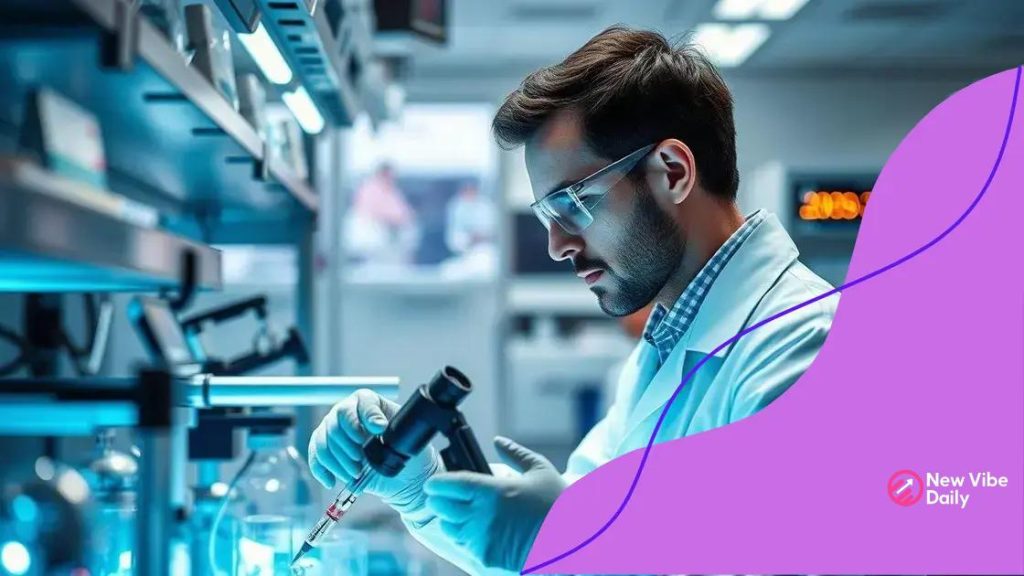Latest scientific discoveries that could change your life

The impact of AI in modern research includes enhanced data analysis, optimized experimental design, and the ability to facilitate interdisciplinary collaborations, driving innovation and accelerating scientific discoveries.
Latest scientific discoveries are reshaping our world in ways we never imagined. Curious about what these advancements might mean for you? Let’s dive into some of the most exciting revelations that could potentially change your daily life.
Revolutionary advances in healthcare
In recent years, we have witnessed revolutionary advances in healthcare that are transforming how we approach medical treatment. These advances not only improve patient outcomes but also streamline healthcare processes. Let’s explore some groundbreaking innovations in this field.
Telemedicine and Remote Care
Telemedicine has become essential, especially during the COVID-19 pandemic. It allows patients to consult with healthcare providers from the comfort of their homes. This is particularly beneficial for those with mobility issues or those living in remote areas.
- Reduced travel time for patients
- Increased access to specialists
- Cost-effective consultations
Wearable Health Technology
Wearable devices have redefined personal health management. These gadgets can monitor vital signs like heart rate and blood pressure in real-time.
They empower individuals to take charge of their health by providing crucial data that can lead to early detection of potential health issues.
AI in Diagnostics
The integration of artificial intelligence (AI) in diagnostics is a game changer. AI algorithms can analyze medical imaging faster and more accurately than human radiologists.
- Improves diagnostic accuracy
- Reduces the workload of healthcare professionals
- Enables personalized treatment plans
These revolutionary advances highlight the ongoing evolution in the healthcare sector, making medical care more efficient and accessible. Embracing these innovations allows healthcare providers to offer better services and enhances patient experiences significantly.
Tech innovations transforming daily life
Today, tech innovations transforming daily life are all around us. These advancements have changed how we communicate, work, and even handle our daily chores. The impact is noticeable in various aspects of our lives.
Smart Home Technology
Smart home devices have become a norm. With just a few taps on your smartphone, you can control everything from your lights to your thermostat.
- Energy efficiency through smart thermostats
- Enhanced security with smart locks and cameras
- Home automation for daily tasks
Mobile Apps for Daily Tasks
There’s an app for everything now. From grocery shopping to managing your finances, mobile apps have streamlined tasks that used to take much longer.
Using these apps not only saves time but also helps keep things organized. For instance, budgeting apps allow you to monitor your spending clearly.
Wearable Technology
Wearable technology like smartwatches has elevated personal health management. These devices track our fitness levels, sending notifications about our daily activity. They promote healthier habits by keeping us accountable.
- Heart rate monitoring for fitness tracking
- Sleep tracking to improve rest
- Goal setting for better health outcomes
Additionally, social media platforms connect us in ways we never thought possible. They allow us to maintain relationships over vast distances, sharing moments in real-time.
These various tech innovations enhance our day-to-day experiences, making life more convenient and connected than ever before.
Recent findings in environmental science

Recent findings in environmental science are uncovering critical insights about our planet. These discoveries enhance our understanding of ecosystems and the impact of human activity. Let’s explore some exciting developments in this vital field.
Climate Change Research
New studies show alarming trends related to climate change. Researchers are now able to track changes in climate systems with increased precision. These studies reveal patterns that suggest a significant rise in global temperatures.
- Increased frequency of extreme weather events
- Melting ice caps and rising sea levels
- Impacts on biodiversity and ecosystems
Pollution and Its Effects
Innovations in tracking pollution sources are also emerging, helping scientists understand its ecological impact better. For example, new technologies can measure air and water quality in real-time, providing crucial data we need.
Pollutants from industrial processes and vehicles have a substantial impact on health and wildlife. These findings emphasize the importance of advocating for cleaner technologies and practices.
Biodiversity and Conservation Efforts
Recent findings highlight the importance of biodiversity. Biodiversity is essential for ecosystem stability and resilience. Various projects focus on conserving endangered species and their habitats.
- Success stories of species recovery
- Importance of protected areas
- Community involvement in conservation
Education and awareness play vital roles in environmental science. By informing the public about these findings, we encourage action toward sustainability. As we understand more about the challenges we face, we can take comprehensive steps to protect our planet.
Breakthroughs in physics and space exploration
Breakthroughs in physics and space exploration are helping humanity understand the universe better than ever. These advancements open new doors to possibilities and challenge our existing beliefs about space and time.
New Discoveries in Particle Physics
Recent studies at particle accelerators have uncovered particles that were previously unknown. This research helps scientists understand the fundamental building blocks of matter.
- The discovery of the Higgs boson has reshaped our understanding of mass.
- New particles may lead to advances in quantum computing.
- Investigating dark matter and dark energy remains a key focus.
Advancements in Space Travel Technology
Space exploration technology is progressing rapidly. Companies like SpaceX are making reusable rockets a reality, significantly reducing the cost of space travel.
These innovations allow for more frequent missions to the Moon, Mars, and beyond. Spacecraft are now built with advanced materials that can withstand harsh space environments while being lightweight and efficient.
Exploring the Mysteries of Exoplanets
One of the most exciting areas of space research is the study of exoplanets. Telescopes are now capable of detecting planets outside our solar system, providing information about their atmospheres and potential habitability.
- Finding Earth-like planets increases the chances of discovering extraterrestrial life.
- Studying atmospheres helps us understand weather patterns in different environments.
- The Kepler and James Webb Space Telescopes have provided groundbreaking data.
These breakthroughs in physics and space exploration not only enhance our knowledge but also inspire the next generation of scientists and explorers. The more we learn about the universe, the more questions we will have, urging us to continue our quest for knowledge.
The impact of AI in modern research
The impact of AI in modern research is profound and widespread. Artificial intelligence technologies are transforming how researchers analyze data, draw conclusions, and solve complex problems.
Data Analysis and Pattern Recognition
AI algorithms can process vast amounts of data quickly. This capability helps scientists identify patterns that might not be visible to the human eye. For example, in medical research, AI can analyze patient data to spot trends related to disease outbreaks.
- Faster data processing speeds up research timelines.
- Improved accuracy reduces human error.
- AI can make predictions about future trends.
Enhancing Experimental Design
Artificial intelligence can optimize the design of experiments. By using AI-driven simulations, researchers can test hypotheses without needing extensive physical experiments, saving time and resources.
This approach allows for more innovative and flexible experimentation. AI helps in tailoring experiments to produce the most relevant outcomes.
Collaboration Between AI and Researchers
The collaboration between AI systems and researchers is creating a new era in scientific discovery. Researchers can leverage AI to enhance their capabilities and focus on the creative aspects of research.
- AI can assist in literature reviews by summarizing findings.
- Machine learning models can suggest new research avenues.
- AI tools can facilitate interdisciplinary collaborations in research.
These advancements show that AI is not just a tool but a powerful partner in scientific research. This collaboration is enabling researchers to push boundaries and explore uncharted territories in their fields.
FAQ – Frequently Asked Questions about the Impact of AI in Modern Research
How does AI improve data analysis in research?
AI algorithms can process large amounts of data quickly, identifying patterns and insights that may be missed by humans.
What are the benefits of using AI in experimental design?
AI helps researchers optimize experiments, reducing time and resources needed for extensive physical testing.
Can AI assist in literature reviews for research papers?
Yes, AI tools can summarize vast amounts of research, aiding scientists in quickly finding relevant information.
What future innovations can we expect from AI in research?
AI’s collaboration with researchers is likely to lead to groundbreaking discoveries and advancements across various fields.






